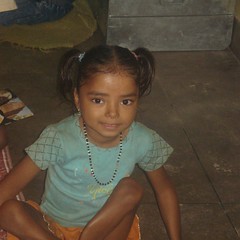
by Anuradha Bakshi | Oct 28, 2008 | Uncategorized
 Little Radha is back. She was away for a whole month as she had broken both her legs after a stool fell on her brittle bones. Not easy to care of a little girl with glass-bone disease when you live in a tiny hovel with hardly any space to move. Ostoegenis Imperfecta is not easy to manage even in the best conditions, in Radha’s case it is quasi impossible. And yet her mother does her best in spite of having 5 other children and a drunk husband.
Little Radha is back. She was away for a whole month as she had broken both her legs after a stool fell on her brittle bones. Not easy to care of a little girl with glass-bone disease when you live in a tiny hovel with hardly any space to move. Ostoegenis Imperfecta is not easy to manage even in the best conditions, in Radha’s case it is quasi impossible. And yet her mother does her best in spite of having 5 other children and a drunk husband.
In spite of her distorted bones and her frail structure, Radha is one of a kind. A girl full of life and spunk whose only dream is to be able to walk. I do not know if inside her she knows she will never be able to; if she does she has never shown it. She is an avid learner and wants to live life king size. And perhaps it is this very side of her that makes me believe that little Radha knows she has little time.
Little Radha’s smile is a lesson for all of us. Her spirit and zest for life is contagious though heart wrenching. As I watch her dragging herself from one side of the room to the other or simply bending over her copy book, her tongue poking out in deep concentration I am filled with a sense of total helplessness. I know what awaits and I also know there is nothing or little I can do. So help me God!
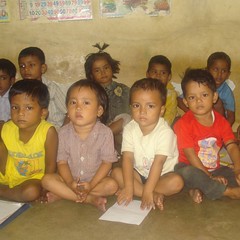
by Anuradha Bakshi | Oct 27, 2008 | Uncategorized
 I have been looking at your website, since I arrived in Delhi a few months back. I have been able to see with my own eyes how some kids are living in this area, and despite their hard lives, they still keep on smiling, which gives anyone the will to live and enjoy life in the simplest way. I am writing to you today to see if you need a person to help you time to time, I do not have a job here yet and therefore I am not able to donate some money, but I am willing to give some of my time, help or love if needed.
I have been looking at your website, since I arrived in Delhi a few months back. I have been able to see with my own eyes how some kids are living in this area, and despite their hard lives, they still keep on smiling, which gives anyone the will to live and enjoy life in the simplest way. I am writing to you today to see if you need a person to help you time to time, I do not have a job here yet and therefore I am not able to donate some money, but I am willing to give some of my time, help or love if needed.
These simple words from someone I have never met dropped in my mailbox this morning. To me they were the most precious gift as they validated much of what I hold as true. Today’s world is engrossed in seeking things money can buy and hence is also blinded by its obsession to make more and more money. In that frenzy we seem to have forgotten that there are more valuable, rewarding and abundant things waiting to be discovered. The recent events have shown how fragile and shaky the gaols we seek are!
The smiles that greet me each day as I walk into pwhy truly remind us that happiness is not directly proportionate to the size of a wallet or bank balance. These kids have nothing to smile at were we to apply our canons of success. Some went to sleep hungry, others may have been beaten by a drunk father. Some cannot walk, or talk or even hear. And yet they smile with abandon at the slightest prompt.
We seem to have forgotten how to appreciate small things, how to enjoy the beauty that surrounds us, how to marvel at a flower just bloomed or bask in the morning sunlight. We have forsaken the simple pleasures that lie in wait at every corner of our lives. We are just busy counting our gains and losses. When we hear the word give we recoil in horror as we are convinced that everyone just wants our shrinking pile of money. We simply forget that there is so much more we can give: time, help or love as writes my young friend. These are far more precious than all the gold in the world as with these you give a little of yourself.
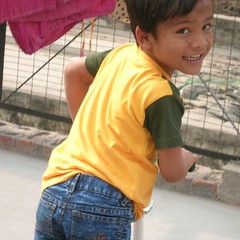
by Anuradha Bakshi | Oct 26, 2008 | Uncategorized
 Utpal is home for his Diwali break. Home this time is the women centre without mom as she is back in rehab. Home is where his toys and preferred TV programmes await his return, where the fridge is laden with his favourite goodies and where his pals both big and small look forward to his homecoming.
Utpal is home for his Diwali break. Home this time is the women centre without mom as she is back in rehab. Home is where his toys and preferred TV programmes await his return, where the fridge is laden with his favourite goodies and where his pals both big and small look forward to his homecoming.
On his way home, Popples dropped by my home. He sauntered in a huge smile on his face, a twinkle in his eyes. After some hugging and cuddling, he fished out a folder sheet of paper from his pocket and handed it to me. It was a Diwali greeting card, the kind every school child makes: some glitter, a handful of lamps, candles and diyas carefully coloured with crayons, and the customary Happy Diwali in curly letters. Inside the card was a simple message: Rose is red, sky is blue, Mummy and Daddy I L U.
As I read the words, my hear missed a beat. I looked at him and softly asked him: is this for me? The answer was a simple: yes.
I was moved to tears; my throat choked painfully. I just hugged him tighter unable to utter the words I wanted to. He simply held on to me tight. Then like all little boys he wanted to know what i had got for him and whether there was an orange – his favourite fruit – in the fridge. Needless to say there was. We spend some time chatting and he told me about his maths test that had been held the same morning and in which according to him he had secured 10/10! After a while he wanted to go off to the women centre and watch cartoons.
I sat for a long time, his precious gift in my hands. I wonder whether he understood the meaning of the words he had scrawled, whether he realised that there were things in his life which were different. Did he feel he was missing something is pals had. Or was his still too young and had just made the card without grasping the meaning of the words. Or was it that he felt that it was meant for the people he cared for and hence for his maam’ji! I knew the day would come when real questions would spring in his mind and when answers would have to be found.
My thoughts went back to what I had written in dear Popples: Popples you will have to, one day, write an essay about your family and you will find it very hard to do it because if you do what big people ask you to, then you will be writing a pack of lies, and if you write the truth, your little friends may not quite understand. But I want you to know that if you begin by writing lies then you will have to do so all along, whereas if you say the truth and even if one person sticks by you, you will have won!
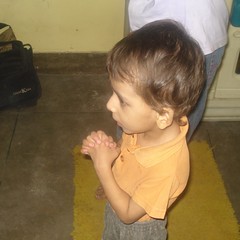
by Anuradha Bakshi | Oct 24, 2008 | Uncategorized
 God bless India were the words chosen by the Orissa nun who had been mob raped in August to end the almost half an hour statement recounting her horrific tale. In a controlled and choked tone she related how she had been abused, humiliated, violated and defiled. Her narrative was graphic. She described everything she was subjected to including the total apathy of the police.
God bless India were the words chosen by the Orissa nun who had been mob raped in August to end the almost half an hour statement recounting her horrific tale. In a controlled and choked tone she related how she had been abused, humiliated, violated and defiled. Her narrative was graphic. She described everything she was subjected to including the total apathy of the police.
I sat in total silence, dumbfounded and shocked. Her last words carried terrifying portent. Which India was she blessing? The one that had stood silent and watched her ordeal? The one that had refused to give her justice? The one that claimed thousands years of civilisation and tradition but could not protect one of its own? Or the one that today was using her harrowing ordeal to garner political brownie points?
Which religion are we defending as we chose to violate a woman of faith? In which God’s name were such acts perpetrated? And what makes seemingly innocuous human beings commit such horror?
The questions are endless, the answers few or empty. I was shocked beyond words by the pathetic and pitiable defense put up by a guest at a talk show debating the issue: the rape has not been proved he shouted. I would like to ask him what more proof did he need than the woman herself saying on national TV that she was raped. Need I remind him that it is not easy for any woman to come out in the open, least of all one who has taken wows of chastity? But who is listening, no one is really interested in the plight of the poor woman. Every one is seeking his pound of flesh.
There are more disturbing questions, the ones that address the cause and not the effect, the ones that are never asked for fear of revealing what we are not ready to hear. Why is this happening? What is making people act in such dastardly ways? What is ailing our society? What lies behind it all? Where are we heading?
who invade the privacy our homes through innumerable TV programmes and intoxicate us with nonsense? I wonder why not one of them has ever denounced such And again I have no option but to resort to my leitmotif: the widening gap between the have and the have nots, the absence of any self respecting system of education, the total abdication by the powers that are to address real issues. Such are acts are indeed whipped up by some vested interests but are executed by disgruntled and weak individuals seeking instant gratification and unless we address the problems of such individuals we will never be able to reverse the situation. But again who bells the cat: a hijacked education system that has lost its way and instead of bridging gaps is playing to the gallery and widening them; religious Godmen who invade the privacy of our homes through innumerable TV programmes. I wonder why not one of them had ever denounced such despicable acts.
Unless we garner the courage to face real issues, such acts will continue. Another headline will replace the story of Sister Meena, actually it already has and even those of us who were moved to tears by the tale will move on. Such is life. I wonder how many more such horror stories will it take to awaken our collective conscience.
God bless India said sister Meena. I wonder which India she was referring to.
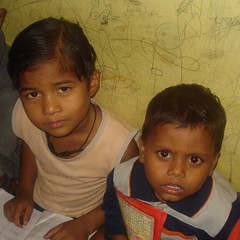
by Anuradha Bakshi | Oct 23, 2008 | Uncategorized
 Ho’oponopono means to make it right. It is an ancient Hawaiian healing technique that can be applied to any problem or difficulty. The reason why I talk of this today is because of an incident that occurred yesterday and that left me quite baffled.
Ho’oponopono means to make it right. It is an ancient Hawaiian healing technique that can be applied to any problem or difficulty. The reason why I talk of this today is because of an incident that occurred yesterday and that left me quite baffled.
The daughter of a dear friend came to me with a problem seeking the right answer. She was on her a way home in a three wheeler when a small accident occurred involving a bigger car. No real harm was done and the protagonists could have continued their journey without much ado, But that was not to be. The occupants of the car forced the rickshaw to stop and pulled the driver out and started bashing up violently. The poor man kept apologising profusely but to no avail. The beating and abusing carried on mercilessly. My little friend tried to glare at the perpetrators but that seemed to have the opposite effect as the miscreants decided to play to the gallery. A small crowd gathered, mostly simple workers and bystanders. The enraged men shouted at them and they too dispersed. Someone gently told the young to take another ride home.
The young girl came home visibly shaken by the incident. What disturbed her most was the fact that she had walked away and not been able to help the poor rickshaw driver. She wanted me to tell her what she should and could have done. She felt like a coward for having walked away.
We sat for a long time trying to find an answer, and sadly in the given circumstances and situation there was none. Rage that seems to have become the order of the day. The arrogance of the rich and the helplessness of the poor provide the right stage for such incidents that seem to be the rule rather than the exception. And once again we seem to be healing the effect and not the cause. The true answer lies elsewhere. In ourselves more than in others but are we willing to look inwards.
I looked for answers too, larger ones and that is when I remembered ho’oponopono. It is a code of forgiveness whereby you have to accept as being the cause of everything that surrounds you and learn to forgive not only others but yourself. The problem with things around us today is that we thrive in the blame game and never accept our part of responsibility let alone begin to forgive. The men in the car could have simply forgiven the rickshaw driver and moved on. The young girl has also to forgive herself for having walked away.
It is time we all learnt to ho’oponopono.
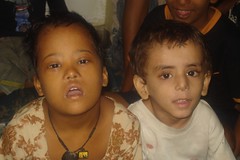
by Anuradha Bakshi | Oct 21, 2008 | Uncategorized
 When did you last say thank you to the man who washes your car, the one who delivers your newspaper or the one who collects your garbage every day. When did you smile at the lady who leaves her children to come and look after yours? When did you look into the eyes of the waiter who served you your coffee while you sat laughing with your pals? A mail from the founder of dream-a-dream reminded us all of just that. He said: Change, I believe, will have to happen in two-ways. One, empowerment of the vulnerable who can stand up for their dignity, respect and rights as an equal in society and at another, more difficult level, empowerment and sensitization of the community of people like us who over generations have become immune to the prejudices and biases we exercise in our daily lives.
When did you last say thank you to the man who washes your car, the one who delivers your newspaper or the one who collects your garbage every day. When did you smile at the lady who leaves her children to come and look after yours? When did you look into the eyes of the waiter who served you your coffee while you sat laughing with your pals? A mail from the founder of dream-a-dream reminded us all of just that. He said: Change, I believe, will have to happen in two-ways. One, empowerment of the vulnerable who can stand up for their dignity, respect and rights as an equal in society and at another, more difficult level, empowerment and sensitization of the community of people like us who over generations have become immune to the prejudices and biases we exercise in our daily lives.
As we sit watching the market crashing and stocks tumbling and dolefully counting our losses, it is perhaps time to take a peep into ourselves and see what we have truly lost. If we do so with honesty and candor we will be compelled to realise that over the years we have lost our ability to care, love, give an reach out to others. Hubris took hold of us in more ways than one, and we lived insulated little lives protecting what we had been taught to believe as being the only asset of true value. We had all become targets of what a friend called financial terrorism. A very insidious form of terrorism as it does not operate through violent and visible attacks, but feeds on surreptitiously creating large than life dreams in innocent people’s lives, dreams that are waiting to crash.
It was almost two years ago that I wrote about my fears about plastic money and bank loans reaching the pockets of the poor. But the adversary was too big for me, the terrorist forces were at work and the dreams too tempting to resist. It has been two years since the loan was taken. The money was used in a day to add veneer to a wedding. And since that fateful day the little family of 5 has had to live with half a salary, the other half being used to pay the dreaded EMIs. This is just one instance. There are innumerable others.
But was this post not about saying thank you! or rather about the importance of getting past our prejudices and fears, of reclaiming lost values like compassion and empathy. I somehow feel that it is the new mantra we have all been taught to chant that is the cause of such a behaviour. In a world where the material, the visible and the transient are valued, there is no place for the immutable, the permanent and the invisible.
Maybe it is time to reclaim lost values and make them part of us. Maybe it is time to garner the courage to look at those we take for granted and whisper a simple thank you. I am sure that we will be the ones truly gratifies. I an never forget the beggar woman who many years back thanked me warmly not for having given her a coin or banknote, but for having simply looked into her eyes and told her that I was sorry i did not have anything to give!
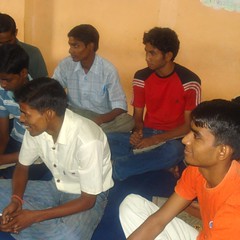
by Anuradha Bakshi | Oct 17, 2008 | two indias
 Today, I was treated to one of my best moments at pwhy. The day began normally and nothing would have prepared me for what was to come. As I was about to leave the office I asked my colleagues what was their plan for the day and they answered that they were going to the senior secondary section as the students were having an English Debate competition. I must confess I was a tad vexed at not having been invited but I said nothing and went my way.
Today, I was treated to one of my best moments at pwhy. The day began normally and nothing would have prepared me for what was to come. As I was about to leave the office I asked my colleagues what was their plan for the day and they answered that they were going to the senior secondary section as the students were having an English Debate competition. I must confess I was a tad vexed at not having been invited but I said nothing and went my way.
As luck would have it an appointment got canceled and I found myself with time on my hands and decided to make my way to the senior secondary and be part of the debate. I do not know whether my move was apreciated but everyone played by the book and I was greeted with warmth by all. A dozen boys were in the class room and just one girl. The students were mostly from class XII, XI, X and IX. Some time later three girls joined the group. Though initially a debate had been planned, Gunjan the English teacher sprung a surprise on his nervous wards. Everyone was to chose a topic and speak for at least a minute. The new dictate was met with bewildered looks, nervous glances and uncomfortable stances but the teacher was relentless. After brief introductions it was time for the first speaker to address the audience.
The next hour was an absolute delight in more ways than one. The topic selected by the students were varied and showed a great deal of maturity and wisdom. Child marriage, dowry menace, terrorism, education, environment, importance of doctors were some of the chosen topics. Some spoke with confidence, some with some hesitation but each one stood proudly in front of an audience where some were outsiders and shared their dreams, hopes, fears and aspirations in a language they were learning to master. I must confess that for once the boys outdid the girls.
Young Ravi who bagged the coveted first price took my breath away. He chose an unexpected and somewhat trite topic – traffic – and in 1.50 seconds painted a socio-economic canvas of today’s India. Ravi’s English would be considered by many as wanting, his construction faulty and his grammar poor but he managed to convey everything he set out to, vindicating my firm belief that language is a communication tool and should be viewed as such.
Ravi’s speech was a delight. He used stunning metaphors and images to convey what he wanted. The one that bowled me over was: the roads are houseful – to convey the state of traffic on Delhi roads. In his nascent English, Ravi talked about the misplaced egos of Indians where families had not one, not two but four cars! He talked of the car companies always coming up with bigger and newer models to tempt consumers. He mentioned increased pollution and subsequent health hazards. He even touched upon the apocalyptic scenario that waits us with the arrival the low cost Nano that would make roads even more houseful! He even highlighted the fact that in other countries people were content with two cars per family. He ended by saying that he walked the talk as he had neither car nor bike. What a stunning little speech it was, delivered with passion and aplomb.
Everyone shared their views with sensitivity. It was a moving moment as I sat and listened to the hopes and fears, the likes and dislikes of these wonderful and yet forsaken children of India. Here they were rearing to go but we had assured that they would run the race of life with tied hands. The education doled out to them was nothing short of mediocre, one that even with the best effort would never enable them to win the race.
And yet as I watched them, all I saw was winners who had beaten all odds and were determined to break glass and lead ceilings and it accrued to us at pwhy to help them do so. It was also a proud moment as many of those who stood in front for me were toppers in their schools thanks to the efforts of our precious teacher Naresh. While introducing themselves they had also shared what they wanted to be: math teachers, chartered accountants, computer engineers, pilots, were some of their aspirations.
I left the room with a silent prayer to the God of Lesser Beings, entrusting these precious dreams to his care.
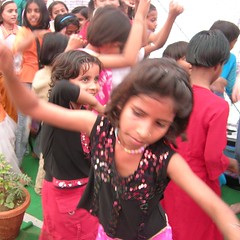
by Anuradha Bakshi | Oct 15, 2008 | Uncategorized
 It is that day of the year when I remember Kamala, my mother. Last year on this very day I dedicated our women centre to her. Kamala was an extraordinary woman in more ways than one, a true free spirit in times were women were often relegated to the shadows. She was passionate about many things but what she cherished the most was education, something she achieved with great difficulty and strife. When I decided to open a women centre it had to be dedicated to her memory. Today one year down the line, it is time to ask whether the women centre is worthy of the one whose name it bears.
It is that day of the year when I remember Kamala, my mother. Last year on this very day I dedicated our women centre to her. Kamala was an extraordinary woman in more ways than one, a true free spirit in times were women were often relegated to the shadows. She was passionate about many things but what she cherished the most was education, something she achieved with great difficulty and strife. When I decided to open a women centre it had to be dedicated to her memory. Today one year down the line, it is time to ask whether the women centre is worthy of the one whose name it bears.
The Kamala centre is a placed filled with joy, laughter and a palpable energy. In the span of a short year it has over 200 children and long waiting lists. Over 50 women come each day to learn stitching of beauty skills to enable them to slowly take the road to financial independence. One a week there is a women’s meeting where many topical and sometimes. disturbing issues are debated while sipping tea and nibbling on biscuits. Till now the women have talked about gender bias, child abuse, women’s rights, girl child, HIV and much more. Simpler issues have also been discussed: hygiene, balancing household budgets, saving, immunisation and insurance. On a lighter vein and on popular demand there was also a pasta cooking session where the women were taught how to make pasta in tomato sauce!
The Kamala centre also has a library, that is even open on Sundays. The children are thrilled and consider the library as one of their most precious possession. Not a single book has been torn or misplaced. The Kamala centre is a vibrant place. It is not simply a study centre but a true children centre, one that they consider their very own. They celebrate festivals and come to play in it after working hours. It is a place where children know they can reclaim their right to be children and they do!
The centre may be just a year old but it is imbued by Kamala’s spirit and a reflection of all she believed in. It holds in custody the dreams of aspirations of a many: children on their way to a new tomorrow; women slowly getting empowered. It is a place where people of all caste, creed, social background come together as one in a true celebration of life itself.
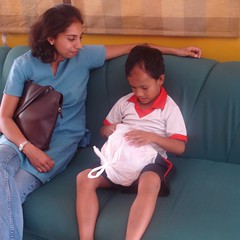
by Anuradha Bakshi | Oct 13, 2008 | fostercare, okhla
Normally it is left to me to blow the project bugle and list its achievements. Not an easy task I must confess. A few days back Megha our Asha stewart was here for the yearly mandatory site visit. She spent a few days at pwhy interacting with staff and children. When she sent me a copy of the report I felt I was looking at pwhy through fresh, candid and honest eyes and was vindicated in many ways and truly overwhelmed. I share the report with all of you.

Project Overview:
Project Why (pwhy) runs a number of centres that provide after school education for children from slums. They also have creches, a centre for disabled children and adults, and a women centre. We supported about half their budget in FY 2007-2008. They have recently begun an initiative, Planet Why to generate income that could be used to support the activities of Project Why.
Site Visit
PWHY was started by Mrs Anouradha Bakshi in 1998 as an endeavour to return her debt to society. It started with English classes for kids from the Govindpuri slums. In a decade they have grown to 13 different centres reaching out to approximately 600 children in three low income/slum areas of New Delhi. The field coordinators are Shamika (her daughter) and Rani (a resident of Govindpuri). Mrs Bakshi is the big picture person and chief fundraiser. Shamika and Rani handle the day to day logistics of pwhy which includes speaking with students, parents, managing teachers and resolving any type of community issue that crops up in their classes. Shamika has trained to work with autistic children and Rani has a degree in nursing. Rani is in fact a product of pwhy, having been one of its first students.
My site visit was spread over a period of one week where I was very cordially taken around the various centres, introduced to teachers and was able to have exhaustive discussions with Anou, Rani, Shamika, Barbara (a visiting volunteer from UK who worked with the British civil services) and Mr. Dharmendra (who runs the women’s centre).
Visit to centres
Pwhy office is located in Govindpuri, gali no 3. A narrow lane leads up to a three story building that the project owns. The ground floor is for mentally and physically challenged children and adults. They are divided into three groups based on the level of their disability. The first floor is a creche for children from 1.5 to 3.5 yrs of age. The disabled children and creche babies are picked up from their homes and dropped off to the centre each morning. The second floor is a primary after school centre and the final landing has an office and small kitchen. Across this building is the foster home and another primary after school centre in a rented accommodation. In Govindpuri, gali no 1 is another creche where I was treated to nursery rhymes and number recitation. Many kids were absent due to a flu that was making the rounds.
A five minutes ride away is a primary after school centre located in the very heart of the Govindpuri slums. A labyrinth of narrow lanes, criss-crossing many homes, kirana shops and recycling businesses leads to a single storey rented accommodation. A gutter along the homes was chock full of unhealthy and smelly sewage. In spite of this I landed into a neat, clean and odor free classroom with children bent over their books and two teachers administrating over 3rd and 4th standard boys. Teacher: student ratios were about 1:10 but this fluctuates with time as the after school program is voluntarily attended by children. I doubt if I would find this classroom without Shamika and Rani seeing as a dizzying circuitous route is needed to reach it!
A ten minutes ride away is the Okhla primary after school centre. This centre has an interesting history. Ms. Sophiya, one of the teachers who has been with pwhy for 7 years urged Anou to start a centre in Okhla slums because the Govindpuri centre was too far for the children and could not in fact accommodate more children. After much debate with the community, one room brick building (10’ X 20’) was built. This structure was repeatedly broken by miscreants from the locality over a period of one year. In Shamika’s words – “Saturday we would lock the room and on Monday nothing would remain.” Pwhy remained persistent and by focusing on their educational activities they were able to convince the community to embrace the learning centre. Today, outside the room a boundary wall has been erected and children sit out here, under a canopy, since they are too many to be accommodated into the room. The roof leaks, there’s a rudimentary toilet since the slum has no plumbing and the kids have to sit through hot summer months under one fan or huddle together in the one room during cold winters. In spite of this the teachers remain resilient and kids look very happy.
Located in the Sanjay colony slums, a five minutes ride from Okhla is another primary education centre. Situated on the first floor, this primary centre has three teachers who were busy with their charges when we visited. The door was locked because dogs were using the ground floor as a sleeping area and bothering the children.
The furthest away is the women’s centre located a twenty-minute ride away from pwhy office, in the Sarita vihar village. This centre runs independently solely due the perseverance of Mr Dharmender, the manager of this centre. Dharmenderji has been with pwhy for 8 years and started as a teacher. Realizing his potential and interest in taking on a bigger role Anou has made him sole in charge for the women’s centre. His commitment and passion are evident by the amount of progress he has made in just 8 months since the inception of this centre. It took several months for him to find the right space and convince a landlord to rent it to an NGO. The interior was then re- designed to accommodate a creche, sewing class room, beautician’s class room, library, room to house women, a kitchen and, a primary as well as middle level after school program. The after school kids occupy space on the terrace under a canopy bravely withstanding the heat (they have only two coolers so children sit close to it by rotation – another innovation by Dharmenderji). Not only does he run the entire outfit but he’s also called on each day to resolve the myriad problems of his students and parents. The after school programs are so successful that he has started a waiting list!
He’s also done a remarkable job with the women who stay at the residential centre. Junoon, who was diagnosed with bipolar disorder was ably handled each time to calm down. She was in rehab when I visited. Having querulous women is also a problem with the neighbouring community who will not tolerate this type of behaviour making his negotiation and diplomatic skills all the more valuable. Dharmenderji is grooming the centre to function independently from him by setting up processes that encourages the various teachers to take more initiative and ownership in their endeavours. Dharmenderji will take over the administrative running of planet why and is wholly committed to making it a reality. Meanwhile his thoughtful, humble and intelligent manner have greatly distinguished his contribution to pwhy and I can’t think of a better manager for planet why.
The women’s centre was also a pilot program to see how project why can run a centre far away from the main office as well as one that ran numerous activities. So far the pilot has been successful and the problems they have had to set it up have provided valuable lessons that they can apply to planet why.
At the Girinagar slums is another rented accommodation. This is located 10 minutes from the main office. The ground floor contains a computer centre that is open to the public. Internet is available at a nominal rate of Rs. 10 per hour and computer classes are also administered here. The first floor is the domain of Mr Naresh perhaps, the most beloved of teachers at pwhy. He teaches maths to the senior secondary students andserves as a valuable role model to all his students. There’s also a library here. From the last batch a student called Janaki ranked 13th in the Delhi CBSE board exams. There aren’t as many senior maths teachers so his role is invaluable. It has been difficult to expand high school after school programs since there are too few maths teachers who can teach in Hindi at that level.
General comments and observations
All centres and classrooms are spotlessly clean. Students are responsible for cleaning them after class. The walls are decorated with charts and the children’s handicrafts. There’s a white board in each centre that is being used as per need – in some they have taken the place of blackboards and in some they are activity boards while in others they have a timetable. It’s particularly nice to have these instead of chalkboards because in the crowded small classrooms chalk dust causes discomfort.
All teachers (except from women’s centre) meet during noon to partake in the daily lunch together. The lunch is provided by pwhy in the terrace of the Govindpuri office. This ritual is very useful as it serves as a forum for the teachers to discuss their problems with Shamika and Rani and between themselves. They exchange stories and solutions. A valuable bonding time has been established.
All pwhy’s transport is taken care of by three autos that are driven by parents of children that attend the schools. They are full time employees of the NGO and they are indispensable. They cart children from various homes in slums to the creche ensuring that the children come to school and ferry Shamika and Rani, and their daily rounds of various centres.
- An unusual feature of pwhy is that teacher retention is high. Two contributing factors to this are All teachers are local i.e., they live in or very close to the slums where they teach
- Teaching provides employment to people who would otherwise have to do manual labour.
One example is Ms Sophiya of the okhla centre who is belongs to the SC/ST class and was unable to get employment as a teacher although qualified for it. Since pwhy doesn’t run schools it can employ people who don’t have teaching degrees but have had an education such as the two brothers Sanjay and Vikki who are lohars (migrants from the blacksmith gypsy community) and lived in a slum that was broken down. They teach the primary classes and if not for pwhy they would not have been able to get good jobs that would use their education.
Over all teachers at pwhy are very proud oftheir work and derive satisfaction from the respect and adoration they receive from the parents and children. Indeed, they are looked upon gratuitously byparents who otherwise, would have treated them with contempt just because of their caste!
There have been exceptions. A few years ago one centre had to be closed because teachers were taking extra tuitions for the children who attended their classes and charged them for the service; essentially they used pwhy for recruitment and space to further their tuition business.
- Except for the foster children and staff no child is explicitly provided with lunch.Most children eat their meal at the govt school under the mid day meal scheme. Children who come to the creche bring their own lunch. I was surprised by this, but Shamika gave me the reason – pwhy feels that parents need to take some responsibility towards the care of their children. The 9-5pm creche provides a safe environment for children of families where both parents work and no one can stay behind to take care of the child. Since pwhy takes a nominal Rs 1/ day per family the lunch acts as an alternate reminder to the parents that they too are participants in the child’s upbringing and not to take pwhy’s role for granted. Of course children who do not bring their lunch are given a portion from the staff lunch.
- Teachers are keen to learn English. An English teacher from US, Ms. Nina plans to work with them to improve their English as well as their teaching methods to grasp the language. Speaking good English is perhaps the best confidence that we can give these children.
- The foster home was an inadvertent addition to pwhy. Encouraged by the donor who was to fund planet why these children were taken in as the first batch of entrants to planet why. When the donor quite abruptly pwhy decided that they had given too many dreams to these children to send them back to their homes (if they had any!) and has continued to take care of them. All except the disabled children will be placed in a boarding school next year. Many are older than they appear but were malnourished and with no education when they were brought in. They have been attending a kindergarten and have caught up to Std 1 education. These children would be a good match for the Support-A-Child program. Anou has already identified an appropriate boarding school for them.
- The boy’s come to school in the morning and girls in the afternoon because the govt school is open for girls in the morning and boys in the afternoon.
- Pwhy attempts to provide a little more than after school education; they are very careful not to refer to their centres as tuition centres as they try and provide a holistic and not just academic education. They have sponsored various open heart surgeries.
- Another nice thing about their processes is that it is very open to change. The organization has a constant influx of volunteers – mostly foreign who spend time here in various capacities. They also interact with other NGOs, most recently with Praxis that carried out a SWOT (Strength, Weakness, opportunities, threats) on their employees.
Overall impressions
Project Why is a vibrant, dynamic organization that works with flexibility and love in the community that they serve. Their teachers are passionate and committed. Ithas a flat organizational structure encouraging its teachers to innovate and share their ideas. The strongest fear the teachers have is what happens if Anou passes away. Although Rani and Shamika are the logistical branches of pwhy it’s Anou’s unflagging spirit and fundraising effort that keeps pwhy running. Her energy is the strength of her teachers. Anou recognizes this and is trying to work towards a model where all her centres are community owned and run. This might take a while to be realized given that some parents are so overwhelmed that even the nominal Rs 1/ day is out of their reach or sometimes they are unwilling to be equal partners because they want things for free. Rani and Shamika are being encouraged to participate in fundraisingactivity. So far their small efforts ( selling raffles in the community or at a college fest)have been resource intensive and without good returns. India being the land of judging a
book by its cover has led them to feel under confident in corporate settings. It’s ironic since these two girls are the ones who interact with each child, parent and teacher in pwhy! I’m sure given the right impetus they will soon take a more proactive role in fundraising.
Asha-Seattle currently supports approximately half of pwhy’s budget and I certainly felt our project partner had exceeded their mission statement and our donor money is going towards building a more educated society.
Project Why
Location: New Delhi
Site Visit Report
25th – 3rd Oct 2008
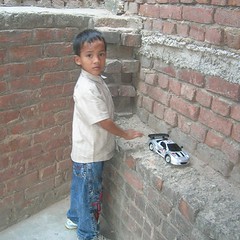
by Anuradha Bakshi | Oct 10, 2008 | Uncategorized
 Utpal was home for his Dusserah break. Home to Utpal is the women centre. Normally his mom is there for him but this time she was not. She has again been admitted to a rehab centre and will be there for a few months. Utpal came home to his favourite TV programmes, his toys , his old battered scooter and his favourite goodies that one had filled the fridge with.
Utpal was home for his Dusserah break. Home to Utpal is the women centre. Normally his mom is there for him but this time she was not. She has again been admitted to a rehab centre and will be there for a few months. Utpal came home to his favourite TV programmes, his toys , his old battered scooter and his favourite goodies that one had filled the fridge with.
Utpal came home to his extended family: the staff of the women centre who were all them for him and tried to make up for the missing mom. Though nothing was unsaid and everyone played the game to perfection – Utpal regaling one and all with his new antics and the staff walking the extra needed mile – one could feel that somehow something was amiss. Mom was not there. Many would wonder how a barely present mom, one lost in the hubris of her bipolar disorder, one that often shouts and sometimes hit could be so dearly missed, particularly when one had tried to ensure that all cracks and holes possible but then a mother is a mother.
Utpal, the true survivor did put up a brave front and did not let anyone feel that there was something missing. The only one who knew was me. He did not say anything, but during the time we were together he let his guard down. The big boy that he now wants to be perceived as became a small child veering between moments of extreme affection and tantrums. He snuggled against me and hugged me tight and then insisted I take him out ad spoil him silly. It was not toys or cakes he sought, but some way to fill the huge void left by a missing mom.

by Anuradha Bakshi | Oct 8, 2008 | Uncategorized

I got a mail this morning from Gooj, an organisation I have a lot of respect for and who are doing an incredible work for flood victims in Bihar. The mail was meant to update everyone on their activities on the field and remind one of the horror of the situation. They are doing remarkable work and need to be lauded and supported.
But this is not why I write this blog. Actually a para at end of the long mail caught my eye and made me shudder in disgust: But I would certainly like to send out a word to a few CSR people who call up our office and ask questions like- “how far is Kosi river from Saharsa” and if they don’t get the exact no of kilometers they threaten to report my colleagues to me. Or the wife of a CMD of a public sector company who gave us some ration and clothes at a function with a lot of fanfare; three cameras, a speech delivered thrice to get the right flavor; resulting in wastage of precious time of a GOONJ team member. Or arguments on why a truck can’t be unloaded at 2.00 am in the night? Please do understand that our team is working round the clock under tremendous pressure and with very limited resources. They are also human beings and without any logical reasoning it’s not right to make uncalled demands on them. (The truckwould anyway be allowed to move out in the morning only). A person from a reputed organization told us that they would give us their contribution at a special function organized for the purpose, for which someone from GOONJ would need to be present. When we said that we didn’t have an office in that city the person wanted someone to travel out or else threatened to give the money to some other NGO. My humble submission to such demands; kindly go ahead and my humble appeal is not to use this as the only opportunity to show how concerned we are. Good work always shows and one doesn’t need banners all around for that. The need of the hour is to spend our time and resources in the most effective manner.”
Phew. I can understand how hurt and angry Anshu, the spirit and heart behind Goonj, must have felt when he finally decided to write those words. I also understand how he felt as it is a feeling I share having also been at the receiving end many times. How can I forget the lady from a prestigious club who brought a few sweaters on a hot September morning and her personal photographer in tow. She insisted that the special kids wear the sweaters in spite of the sweltering heat, so that she could have a photograph for the newsletter of her club! Or can I forget the man who in response to our appeal for help for Raju’s open heart surgery wanted to know why we were spending so much money for just a poor child. Can I ever forget the big star who wanted Arun another open heart surgery candidate to be carted to a web world center to be part of a media blitz. Charity has lost its meaning and become a bizMess. What was meant to be a subliminal act has lost its spirit and makes a little girl to simply ask a heart wrenching question: is it wrong to help those in need?
The list is endless and points to one simple fact: people have forgotten the art of giving. What transpires from the few examples listed above is that it no more the recipient who matters, the star of the show has to be the donor. What do I get if I give? And if you do not give me what I want I will go elsewhere. I wish we could all say please do so. Sadly we are a still dependent on the few coins cast our way as the price to pay is too big. Too many voiceless and helpless souls depend on our ability keep our faces straight and even mouth the needed words of gratitude.
Today when the world is falling like Humpty Dumpty from his wall, no kingsmen will be able to put him back unless there is a change of perception and attitude. One needs to give up arrogance and embrace compassion and learn to share even the little one still has. Hubris has always been self destructive. I am an absolute dodo in such matters but my instinct tells me that the patch up solutions that seem to be the order of the moment are simply delaying the inevitable as they aim at protecting and salvaging a system gone awry.
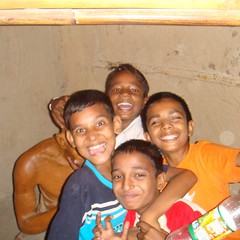
by Anuradha Bakshi | Oct 5, 2008 | Uncategorized
 The time has come wrote my dear friend A in reply to one of my sombre mails; if ever, this is not the time to despair he added. Strange words at a time when the world economy is collapsing. But A goes on undaunted:We have reached the end of An Age. The next one is here. The world is about to move into a system where Human value will be he currency. What if you could buy education for compassion or two meals a day for making someone happy! Have fun this festival – the world has woken up after a slumber of 40 odd years – light up the world with your Unique Value – and Welcome to The Age of Imagination.
The time has come wrote my dear friend A in reply to one of my sombre mails; if ever, this is not the time to despair he added. Strange words at a time when the world economy is collapsing. But A goes on undaunted:We have reached the end of An Age. The next one is here. The world is about to move into a system where Human value will be he currency. What if you could buy education for compassion or two meals a day for making someone happy! Have fun this festival – the world has woken up after a slumber of 40 odd years – light up the world with your Unique Value – and Welcome to The Age of Imagination.
Don’t smile or smirk. These words are imbued with meaning and wisdom. They are almost prophetic. It is time we saw the reality of things instead of beating a dead horse and finding solace in ways that have proved time and again to be worthless. Human values have been too long sacrificed at the alter of material ones fuelled by greed, want and cupidity. Our world is not a pretty one even though we would want to believe otherwise. It may be big and fat but it is not beautiful. I do not know if one can truly at this moment begin to imagine a world where values would be extolled above all else; our age has simply done away with them.
As I wrote earlier perhaps it is not the right time to write about compassion and other lofty ideals as we sit perusing the stock market and counting our losses. Or perhaps it is. What betteer time than this to garner the courage to look deeper within ourselves in order to find solace and strength. The tiny seeds of compassion and forgiveness and love lie patiently waiting to be watered. Maybe it is time to practice mindfulness as taught by Thich Nhat Hanh and learn to live in the present and be grateful for all that we have. It is also time to seek values that would hold true and be lasting and learn to draw solace and joy from he simple things we have forgotten.
Two meals a day for making someone happy is not as Utopian as it may seem. How long as it been since you have truly made someone happy, and by someone I do not mean a near and dear one but an outsider, one you did not know, one you did not expect anything from. How long has it bee since you have stopped and looked around you, listened to the sound of birds chirping or felt the caress of the passing wind. How long has it been since you have held the hand of a unknown child and walked a few steps with him. How long as it been since you have felt compassion for others and also for your self. There was a time not so long ago where I too felt the need to run helter skelter after material things that I felt I needed. But strangely one I had them I felt the aching need to look for newer ones till the fateful day I met Manu and my life changed.
Today no matter how grim the newspapers headlines are or how hard things I set out to work with a spring in my walk. I do not know what awaits me but I know that there always be something that will bring a smile to my face and warm the cockles of my heart. Oh they are intangible things, the kind you normally pass by. It can simply that the newcomer in the creche who had been wailing every single day has finally stopped crying, or simply a sound made by one that had till then never spoke. It could be a messy and even ugly painting made by one that could barely hold a brush or a bright pink report card accompanied by a grubby sweat that a young one insists on stuffing into your mouth. These are not things money can buy; these have been achieved by slow and patient work and unwavering belief!
And these are things within the reach of all of us if we take time to stop and look with our hearts.
by Anuradha Bakshi | Oct 5, 2008 | common school
One of the tools used during the recent HDCA workshop was photo mapping. A cross section of pwhy children were given cameras and asked to take pictures of what they liked the most and what they disliked the most. The result was stunning and something I want to share with one and all.
The pictures below do not meet any canon of perfection. They are hazy, over or under exposed, badly centered and sometimes even out of focus but I urge you to look at them with the your heart. If you do you will be privy to the lives of children we normally never see or at best pass by: the ones that don government school uniforms and live in part of the city we never roam, children whose family left their homeland on hope of building a better future for their children, children who also have dreams and aspirations, many of which are akin to our own.
As I gleaned through them I must admit that my eyes welled many times. If you look for a common thread almost all the children took pictures of the God and Goddesses in their homes, pictures of their moms sometimes doing housework in appalling conditions, pictures of their family and siblings. Many photographed greenery, trees, plants and gardens and most took pictures of garbage and filth. There were some animals and even a banner seeking help for flood victims. A nice house, motorbikes and even a car led us towards the world of their dreams. Men at work on a road construction site or vegetable vendors were a subtle reminder they wanted to free themselves off and yet one that was their reality. nd pictures of school and library proved that they knew what education meant.
Each picture told a story, one that these children wanted us to know but did not have the words to express. I hope we have the heart to listen, see and understand.
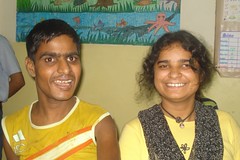
by Anuradha Bakshi | Oct 4, 2008 | fostercare
 Manu and Champa have now been flat mates for over six months. They share the flat with four other little residents and are all part of what we call fondly our foster care programme for want of a better name. In a few months if all goes well the four little ones will leave for boarding school. Whether others will replace them is a million dollar question and will depend on the dirty but life giving word: funds!
Manu and Champa have now been flat mates for over six months. They share the flat with four other little residents and are all part of what we call fondly our foster care programme for want of a better name. In a few months if all goes well the four little ones will leave for boarding school. Whether others will replace them is a million dollar question and will depend on the dirty but life giving word: funds!
But that day is yet to dawn and for the moment life is bindass in our little flat. What is amazing is that our attempt at inclusive living is a success. Not because of well defined rules or training but simply because every one in the flat follows his or her heart. It does not matter if Manu is in his thirties and Champa in her twenties, for little Aditya and his pals they need to be helped and looked after.
I remember the days when the issue of Manu’s daily bath was a huge issue. The simple act of helping a mentally and physically impaired soul have his bath brought out the ugliest side of our land: caste, gender and more of the same. Compassion, humaneness and such values were all forgotten. Yet Manu’s bath at the foster care is no big deal. If Praveen the housemaster is busy little Vicky and Nikhil set out to task and help Manu with his bath. One pours the water the other applies the soap and in a jiffy Many is squeaky clean. Then little Aditya climbs on a stool and sloshes Manu’s hair with oil and voila Manu is ready for the day. If Champa needs help with her mane of hair and Aunty the housemother is not at hand, bossy Babli sets to comb the unruly tresses. For these little kids caste, gender, age, social origin, disability or all of the these are not an issue. Manu and Champa are their flat mates and if the need help our little brigade is ever ready!
When the idea of setting up this programme was first mooted I smiled with glee. here was my chance to show to all that children were the ones capable of ironing all issues, bridging all gaps and fostering humane values if given a chance. And this is what I see each and every day as this motley crew learns to live, laugh, play and learn together. Inclusion is not something that needs to be taught, you simply follow your heart.
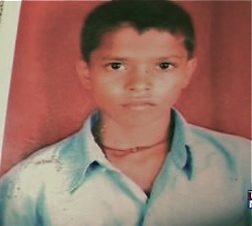
by Anuradha Bakshi | Sep 30, 2008 | common school
 The festival season has begun. In the next few weeks festivals of all faith will dot the calendar reminding us of the indubitable reality that we are one though some would want us to believe otherwise. Complex rituals, feasting and fasting, revelry and merriment are normally the order of the day. But as I woke up this morning I felt none of the habitual joy and excitement. What kept haunting me was the face of a little boy who lost his life in last week’s bomb blast.
The festival season has begun. In the next few weeks festivals of all faith will dot the calendar reminding us of the indubitable reality that we are one though some would want us to believe otherwise. Complex rituals, feasting and fasting, revelry and merriment are normally the order of the day. But as I woke up this morning I felt none of the habitual joy and excitement. What kept haunting me was the face of a little boy who lost his life in last week’s bomb blast.
Little Santosh was barely 10. After school like many other little boys in Delhi innumerable slums, he helped his family who ran an egg and tea stall to eek out a living. Santosh has been sent to get some more eggs as being Saturday and festival time business had been good. Like all little boys Santosh liked being sent off on errands as it allowed him to walk through the crowded markets. On that fateful day the observant lad did not miss the dropped packet and being an honest child he picked it up and tried to return it to its rightful owner. His last words were cut short by a loud bang that blew the little boy and ended his young life. A deafening why rents the air: why did this have to happen?
Another set of disturbing faces have been haunting me of late: that of young educated boys who seem to be perpetrators of the terrible acts that take innocent lives: those who drop bombs or drive away after running over another, those who whip a gun out if slightly riled, those who commit senseless acts that leave one flummoxed. . A muted and perturbing why also begs to be answered: why do young souls turn to such dastardly ways?
And above all the most disquieting why that begs us to ask who is responsible for all this and what part accrues to each one of us.
We were debating this issue yesterday with a dear friend and somehow what the powers that be, the vested interests, the seekers of answers want us to believe does not quite ring true. At best it is nothing but a half baked view of things. If there is divide in society that leads to all this carnage it is not one of faith or creed or social appurtenance. It is far more insidious and surreptitious as it is one we do not want to see and yet it is time we did have the courage to do it. The divide I refer to is the one between the have and have nots to use a jaded term, one that is growing at a vertiginous speed; one whose consequences we cannot even begin to fathom. As the rich grow richer they also seem to become more remote. Is compassion the goat to be sacrificed at the altar of what is know today as success? And as the poor grow poorer they do so while their dream and aspirations grow in quantum leaps.
The fragile and yet all important egos of the young craves for recognition. Everyone wants to be valorised, remembered, recognised, in a word to be someone. No one wants to become a faceless and nameless soul that runs the risk of sinking into oblivion. Each one wants to have an identity and sadly as things are today, no one is willing to give them one. The education doled out to them is faulty and even their most valiant efforts at studies never enables them to reach the ranks of their rich peers; success in their world is limited to a few add ons that no one sees. They may be able to achieve a little more than their parents but a heavy lead ceiling hangs over their lives and can never be broken. In other lands education enables one to rise to unknown heights and break the glass ceiling but in ours even education has bowed to the unwritten rule that governs society: schools for the rich and those for the poor. The divide becomes even more glaring as to counter the slums of the poor we have gated communities for the rich, society is getting ghettoised.
The majority bows quietly and accepts to play the game. A few do not and desperately seek that elusive recognition, that misplaced moment of so called glory. Some even go a step further and fall into the trap of lurking predators looking for the fall guy, the one who will translate their vile schemes into reality. The game is on…
Is there are a way out? One wonders. Perhaps there is but it requires moral courage and commitment. It requires many of us to give up some of the what has been acquired and perfected over the years, it requires to look deep into ourselves and not look away. The main issue is to find ways of bridging the gap that exists between rich and poor and not by handing a few hand outs that we would not miss. Real and solid bridges have to be carefully built, ones that will ensure that everyone is looked at in the same way. I am no social reformer or political activist and what I say is simply based on what I have seen and experienced over the last 10 years. The simple solution that I propose is one that I have always heralded: that of the common neighbourhood school, one that is a centre of excellence and a level playing field for every child born in this land. Education has to be given its place at the helm. One could even have and Indian Education Service like the IAS to attract the best in the land. But to succeed the common school has to be made mandatory and therein lies the problem. Will we have the courage to accept this. And yet it is only then that the lead ceiling can turn to glass.
But even education is not enough without compassion as in the words of Thich Nhat Hanh compassion is the only energy that can help us relate to the world outside. Sadly compassion has long been sacrificed to many altars and is almost an alien notion. When I launched my one rupee a day programme it was also to try and rekindle compassion in a large section of society, to try and reach out to those one usually does not think of as donors and draw them into the world of giving. It still feels intuitively right.
Little Santosh did not have to die and yet he did. He is one of many innocent lives who die because we do not have the courage to face realities, because we look at the effect and forget the cause, because we have simply forgotten to look and see with our hearts. There should not be any feasting or revelry this festive season. Maybe it is time to ponder on the true meaning of the day when good conquers evil and start asking ourselves where evil truly lies in our own reality.
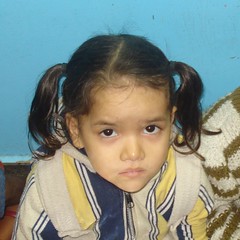
by Anuradha Bakshi | Sep 29, 2008 | Uncategorized
 Kala is four year old. She lives in a small rented accommodation. Her father is a daily wage worker and her mom does household work for. Three months back another baby was born to this little family. It was a baby girl. The father was livid; he had hoped, prayed and wished for a boy. His daily drinking went for bad to worse and he began holding the mother responsible for the baby being a girl. Every night he beats his wife mercilessly. Kala watches in silence hurling abuses at her.
Kala is four year old. She lives in a small rented accommodation. Her father is a daily wage worker and her mom does household work for. Three months back another baby was born to this little family. It was a baby girl. The father was livid; he had hoped, prayed and wished for a boy. His daily drinking went for bad to worse and he began holding the mother responsible for the baby being a girl. Every night he beats his wife mercilessly. Kala watches in silence hurling abuses at her.
When the little baby was but a few weeks old,the father decided that it was time to send the mom back to work as money was needed to pay the ever increasing hooch bills. A simple solution was found: little Kala would tend to the baby while her mom worked. So every morning a little four year old was left to care for her baby sister.
Luckily for kala, the landlord was a kind a wise man.He saw the plight of the little child and decided to act. He brought the little girls to the pwhy creche to get her admitted and simply told the father that if he would not send the child then he would have to vacate the room. In a city like Delhi it is difficult to find accommodation so the father grudgingly agreed. His feeble attempt to thwart the issue by saying he did not have money to send the child was pooh poohed by the landlord who simply said he would pay all that was needed for little Kala’s school. So for the past week or so little Kala comes to the pwhy creche and reclaims her lost childhood. It is pure joy to see her play with toys, laugh and dance and be with children age. She is happy as a lark and perhaps dreams of these moments when she returns home and faces the reality she lives in.
Many thoughts comes to mind as one watches little Kala play. The first is undoubtedly the simple fact that it only takes one kind human being to save the life of a child and makes us wonder why more people do not reach out in this way. If we as concerned citizens did keep our eyes open and accepted to walk a tiny extra inch, perhaps many more girls would be able to reclaim their hijacked childhood. But there is another disturbing thought that emerges each time I come across a woman being blamed for the sex of her child. Why has there never been a wide reaching campaign explaining that the sex of a child is determined by the father. The mother cannot be held responsible for a child not being a boy. She simply accepts a seed and gives it space to grow.
Such a campaign could free many a woman from life long abuse and hurt in a country like ours where even the educated are not spared. So much money is spent on family planning and save the girl child blitzes. Simply explaining that a woman is not able to determine the sex of a child would go along way in clearing misconceptions and perhaps help the girl child in more ways than one.
It is time we shed our so called puritan ways and misplaced sense of outrage and addressed such issues in a direct and honest way and allow all little Kalas their rightful place.
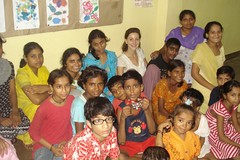
by Anuradha Bakshi | Sep 28, 2008 | Uncategorized
 When asked about a fantasy to be a superhero, one of the children said: “to be able to walk“. This was one of the conclusions of the recently held workshop where children had been asked to express their opinions, dreams and aspirations. The respondent in this case was little Radha who suffers from brittle bone disease and whose condition has been deteriorating day after day.
When asked about a fantasy to be a superhero, one of the children said: “to be able to walk“. This was one of the conclusions of the recently held workshop where children had been asked to express their opinions, dreams and aspirations. The respondent in this case was little Radha who suffers from brittle bone disease and whose condition has been deteriorating day after day.
An eerie silence pervaded the room as we all knew that little Radha would never walk. For what seemed an interminable moment we sat quietly, as we gathered our thoughts and tried to come to terms with what we had heard. We were in a place where neither miracles nor dreams were permissible. There was no reprieve, not even a glimmer of hope. Every day Radha’s fragile bones looked more and more distorted.
Yet Radha has an infective joie de vivre. She also has an insatiable desire to learn and wants to do everything her pals in class do. Just like any child she wants to live life to its fullest and yes if she could be a superhero she simply wants to walk.
For the children in this picture dreams and aspirations taken on a new meaning altogether. They are not of the realm of the impossible, they simply aspire to reclaim that little part of their life that fate has usurped. Some simply want to walk, others to hear or just understand the world around them. They do not ask for much and yet we are helpless and powerless.
However we can give them is love, understanding, moments of happiness and above all acceptance. But how many of us do that. We simply cringe at the sight of one like Radha who sits awkwardly on her brittle and jutting bones and instead of gently gathering her in our arms simply walk away.
During the same workshop Preeti who walks on her hands after a bout of severe polio was asked to photograph a few of the things she disliked most. On top of her list was garbage. Sitting in our comfortable homes we may wonder why she thought so. The answer is simple. For Preeti and Radha who walk on their hands or drag themselves around, garbage is a every day reality that is uncomfortably close to them. They cannot hop over it and do not have the luxury of bypassing it. In slums you often live amidst it.
If you were to come and spend some time with the kids you see in this picture you would be overwhelmed by the love and joy they are ready to give in their own special way. They open their arms and hearts to anyone who accepts to enter their world. They never ask for anything and keep their desires and hopes locked away safely. It is only in rare moments that they share them just like Radha and Preeti did hoping that someone will hear.
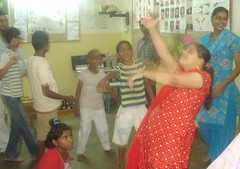
by Anuradha Bakshi | Sep 23, 2008 | Uncategorized
 A little two year old girl was found abandoned in bushes some days back in an upmarket suburb of Delhi. Severely dehydrated and malnourished the child was barely alive. It was later discovered that she suffered from cerebral palsy and that seemed to be the reason why she had been abandoned by her family.
A little two year old girl was found abandoned in bushes some days back in an upmarket suburb of Delhi. Severely dehydrated and malnourished the child was barely alive. It was later discovered that she suffered from cerebral palsy and that seemed to be the reason why she had been abandoned by her family.
The local police chief’s words “Once she is better and if we can find her parents, she will go home. If not, we’ll put her up for adoption and follow all the processes. If nobody wants to adopt her, she’ll be sent to an orphanage,” were ominous. Her family was not traced, no one came forward to adopt her and thus she was sent to an orphanage. The head of India’s adoption agency did not mince when his words when he stated on national TV that no Indian parent would ever adopt a handicapped child! And sadly this is the reality.
The children dancing in the picture above are all what we call handicapped. Some have cerebral palsy, others have brittle bone disease, polio, autism or simple MR. They too could have been abandoned in bushes or simply thrown on the streets to fend for themselves as Manu was. In our country there is scant place for anyone who does not fit the mould. Special children as we like to call them are a embarrassment, an eyesore, a burden, a millstone no one wants. Society rejects them and even the administration does not seem to care. Parents would probably like to wish them away but lack the courage to do so. They are barely tended to, let alone cared for or loved.
And yet in spite of all adversities they not only survive but display a rare zest for life. All you need to do is drop by our special section. You will be greeted by squeals of joy. It may not be your conventional greeting, the one you are used to. It could be a grunt or squeak from one that cannot talk, am energetic hand wave from one that cannot walk, a hug or squeeze from one that has never been loved. You will be invited to join the on going activity or share a simple meal if you happen to come by lunch time. These children have never been taught manners or social skills, they are only proficient in God’s Alphabet or what we call intuition and simply do what their hearts tell them do. They do not judge or gauge you in anyway. They do not care about the language you speak, the way you look or the size of your bank balance. They accept you as you are and simply open their hearts to you.
The have learnt not only to survive but to live life to its fullest if given a chance. Sadly we are not even capable of giving them that tiny chance. I wonder who is the one who is truly handicapped: we or them.
Everyday our special kids dance, it is probably the highlight of their day and each time I see them dance I am reminded of an anonymous quote I stumbled upon one day:
“We dance for laughter, we dance for tears, we dance for madness, we dance for fears, we dance for hopes, we dance for screams, we are the dancers, we create the dreams.”

 Little Radha is back. She was away for a whole month as she had broken both her legs after a stool fell on her brittle bones. Not easy to care of a little girl with glass-bone disease when you live in a tiny hovel with hardly any space to move. Ostoegenis Imperfecta is not easy to manage even in the best conditions, in Radha’s case it is quasi impossible. And yet her mother does her best in spite of having 5 other children and a drunk husband.
Little Radha is back. She was away for a whole month as she had broken both her legs after a stool fell on her brittle bones. Not easy to care of a little girl with glass-bone disease when you live in a tiny hovel with hardly any space to move. Ostoegenis Imperfecta is not easy to manage even in the best conditions, in Radha’s case it is quasi impossible. And yet her mother does her best in spite of having 5 other children and a drunk husband.































